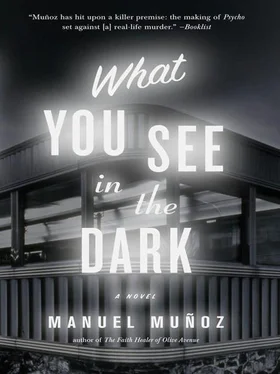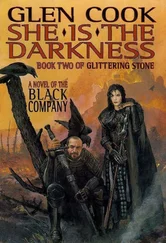She had her own doubts about her ability. Sometimes she wondered if she hadn’t been born twenty years too late, the way she’d been ushered in, discovered when she was up north in the Valley, way past Bakersfield, at the little college where she had modeled. Ushered in: a little star on a string, handshakes with the right people, a contract to sign, scripts to read, and her cooperation at every turn. In exchange, a whole bevy of people hovered around her: hair stylists and publicists, women who led her to Los Angeles department stores for personal fittings, awards ceremony appearances. A whole other life that had nothing to do with acting, nothing to do with any realism, nothing on the level of those European actresses, who came from places rising up out of the rubble of the war and knew a thing or two about stories.
Her scene today would be a woman driving a car, not a word said to anyone. Tomorrow, a character actor would arrive for a scene to be shot somewhere to the east of this very road she was traveling, maybe out by Lancaster. In the scene, the woman has pulled over to the side of the road to sleep for the night, only to be awakened in the morning by a policeman, who knocks on her window and questions her. At most, a three-minute scene, but there was a crucial signpost for Gorman, California, the Director had told them, some signal to the audience that this woman was headed north. Did it matter that no one knew Gorman? She knew it, the little stop-off point for the traffic snaking through the Grapevine from the Valley on through to the Los Angeles area. Almost anyone in Los Angeles would probably know that. But would an audience member in New York City know, or even care?
The Actress wasn’t supposed to ask those questions, and she smirked at herself dismissively, looking out the window. It wasn’t her place to ask. She had a task at hand and nothing more. A silent scene of nervousness just this side of panic. Yes, she thought. That was exactly how she would play it.
It was easy, she knew, and maybe even halfway logical, for an audience to think a film was shot scene by ordered scene. That’s how life worked, after all, one thing happening after another. But this picture was being done piecemeal, a haphazard schedule. She had to think hard about the story. She found it difficult to follow the script sometimes, forgetting where the scene was placed in the story’s arc, what her character did or did not know. But she held her tongue and chided herself: she knew exactly what the Director would tell her. You hold in your hands a script. It tells you everything you need to know. If it’s not there, you don’t need to know it.
She looked up at the October sky over the hills, completely and unsurprisingly blue. Would the weather hold? No rain was expected, not even cloud cover, no worries for tomorrow. Just the technicalities of a short location shoot, away from the city itself and no onlookers: the equipment, the crew, the two actors. All for a scene that wouldn’t take place until well into the movie’s first act. But that was the beauty of editing, the layered splices after so many takes, a story without a seam. Such was her responsibility, to suggest continuity without effort, every scene making its crucial contribution, even though she had little to say. She looked at the script again and pictured how the shooting would go. First, the scene shot with a camera near the driver’s side window. Then the scene shot again with the camera crowding into her by the passenger seat. Then the shots again for line delivery, for lighting, for the position of the actor playing the policeman, for the microphones, for the position of her hands on the steering wheel, for the lighting director to adjust his reflective screens as the sun slowly made its way through morning. Again and again and again.
For such a small role. She wasn’t going to be in the picture after the first third. When the Actress had first read the script, she stopped on the character’s fate, then flipped back to the first page and the cast of characters. She was going to disappear. Violently. She tried to pay no mind to how the Director might have to stage this particular scene, focused only on the end of her character, the bulk of the script’s pages still gripped in the fingers of her right hand.
A supporting role. Nothing more. In the Director’s previous picture, that one actress had appeared playing two roles. She hadn’t done a particularly stellar job, some in the industry had said, but the Actress thought the performance more than adequate. She had sat in the theater with mild envy, the role too rich for words: A distraught wife is trailed silently throughout San Francisco by a police detective, from flower shop to museum to the foot of the glorious Golden Gate Bridge, where she finally tries to hurl herself into the bay. The detective rescues her and later falls in love, only to lose her again to a successful suicide attempt. It played, the Actress thought, like an odd type of silent movie, and she felt maybe she had fooled herself into believing she could have fit perfectly into the part. Was it really requiring much beyond posing, or was there something about silent-movie acting that she didn’t know? She wondered what the script must have looked like, that other actress — who couldn’t have been professionally trained — skimming the pages until she found her first line.
No matter how small the role was going to be, it would have been foolish to say no to the Director. He was in the midst of doing something extraordinary and uncanny with some actresses, finessing their star wattage and burnishing it into a singular, almost iconic image. That was the way the Actress saw it anyway, mesmerized by how he was stripping out all the trappings of the industry and pushing these women toward something beyond even acting, something nakedly cinematic — postures, poses, gestures, as if the women were in magazine ads come to life for just split seconds at a time, just enough motion for the public to remember them as images and not characters. It was like opening up a jewelry box she had had many years ago as a young girl, fascinated by the tiny plastic ballerina in the center and its brief circle of motion. She had closed and opened that box endlessly, even though the ballerina did nothing differently. But even now, in a black sedan carrying her over the Grapevine back toward the Valley, where she had grown up, the Actress could close her eyes and remember the golden lace of the ballerina’s costume, the full circle of her deliciously patient twirl, her perfect timing with the delicate chime of the music box’s single tune. And that was the way the screen worked, too, she had discovered. Every actress’s trajectory carried a moment like that, and the Director was staging them effortlessly.
She could feel the car’s engine release a little — the upward climb was ending, and the road was leveling out briefly before the inevitable decline. She peered over the bench seat to get a look out the front window, but so far they hadn’t reached a place where she could see the horizon of the Valley stretching out before them.
“We’re almost there, ma’am,” the driver said. “Probably another hour or so.”
“Oh, I hope I didn’t look impatient,” she said. “There’s a point in the road where you can see for miles across. I thought I had missed it.”
“You’ve been on this road before, ma’am?”
“Absolutely. Does that surprise you?”
“Well, mostly it’s people going the other way,” the driver said. “Getting away from Bakersfield, Fresno, all those little towns in between. Everyone wants to go to Los Angeles. I don’t see any reason why anybody would be going into the Valley.”
“Fruit buyers. Cotton. Oilmen, too. There’s money to be made down there.”
Читать дальше












